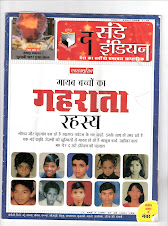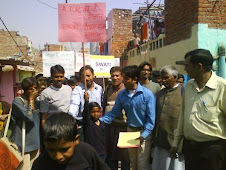Parents of all missing children say they have no faith in police. On a sultry afternoon, a group of about 50 people, most of them women, have gathered outside Jantar Mantar - the 18th-century observatory in the Indian capital, Delhi. Many of them are carrying placards with photos and names of their children who have gone missing in the last few years. Among them is Kamini.
"My son Satyendra went missing seven years ago. He was 10 then. It was 6am, he was playing outside. And then he disappeared. I have no idea who could have taken him. I have no enemies," says a distraught Kamini. The last seven years have been a nightmare for her. "I lodged a complaint with the police. They asked me to have 300 posters made with his photo. They said they will put them up at all police stations in the city. I did, but the posters never went up. I have no idea where my son is," Kamini starts to cry.
Since her son went missing, she has made dozens of trips to the police station but had to return empty-handed each time. Now she says she has lost faith in the police. "If police wanted, they could have found him, but they've not helped me for seven years, why would they bother now?"
Kamini's plight is not unique. Kamini's son went missing seven years ago When Rani's 15-year-old daughter Nagina went missing on 12 June, it took her a week and all her persuasive powers to get the police to register a case. Rewa Lal's son Manish, 8, has been missing since 21 March and Shyam Bahadur's son Sunil, 12, has been untraceable since 15 June. Sangita's daughter Sunita, 5, disappeared on 16 June and five-year-old Farhan's father Abdul Jabbar has not seen his child since October 2005.
"My son Satyendra went missing seven years ago. He was 10 then. It was 6am, he was playing outside. And then he disappeared. I have no idea who could have taken him. I have no enemies," says a distraught Kamini. The last seven years have been a nightmare for her. "I lodged a complaint with the police. They asked me to have 300 posters made with his photo. They said they will put them up at all police stations in the city. I did, but the posters never went up. I have no idea where my son is," Kamini starts to cry.
Since her son went missing, she has made dozens of trips to the police station but had to return empty-handed each time. Now she says she has lost faith in the police. "If police wanted, they could have found him, but they've not helped me for seven years, why would they bother now?"
Kamini's plight is not unique. Kamini's son went missing seven years ago When Rani's 15-year-old daughter Nagina went missing on 12 June, it took her a week and all her persuasive powers to get the police to register a case. Rewa Lal's son Manish, 8, has been missing since 21 March and Shyam Bahadur's son Sunil, 12, has been untraceable since 15 June. Sangita's daughter Sunita, 5, disappeared on 16 June and five-year-old Farhan's father Abdul Jabbar has not seen his child since October 2005.
Rani, Rewa Lal, Shyam Bahadur, Sangita and Abdul Jabbar all say they have received no help whatsoever from the police in finding their children. As a last resort, these parents have now appealed to the Indian president and the National Human Rights Commission to help them.
"I don't think anyone can imagine 1,000 children going missing in London. But it happens in Delhi and the administration doesn't even take notice. That's a very sad state of affairs," says Vikram Srivastava of the non-governmental organisation (NGO), Child Rights and You (Cry).
"I don't think anyone can imagine 1,000 children going missing in London. But it happens in Delhi and the administration doesn't even take notice. That's a very sad state of affairs," says Vikram Srivastava of the non-governmental organisation (NGO), Child Rights and You (Cry).
"There are two possibilities why children missing for even five or seven years are not found - one, the police are unable to find them; two, they're not interested in finding them. And I believe it's the second reason," says Bharat Singh, convenor of Alliance for People's Rights, an umbrella of Delhi-based NGOs working with marginalised communities. Mr Singh says police do not care for the poor. According to statistics, of the 45,000 children that go missing in India every year, 11,000 are never found. And, according to a survey by the Alliance for People's Rights, 80% of the missing children belong to poor, marginalised communities living in slums and resettlement colonies. Activists say girls are taken away for the sex trade, boys are used for child labour, or made to beg by cartels. They are also sexually abused by paedophiles.
"The administration and police have class biases. The poor don't have a voice, so police don't register their cases. They are very selective in registering cases. And when they do register a case, there is no proper investigation," says Mr Srivastava.
Mr Singh says, "The police and administration react fast when a child from an affluent family goes missing. We want the poor to get the same treatment. They have the same rights. We want all the missing children found, we want the police to be more receptive to the poor."
The Indian police's apathy towards the children of poor is well known. In December 2006, the nation was shocked when skulls and remains of 17 people, mostly children, were found in a drain in the Delhi suburb of Noida. It took Rani a week to persuade the police to register a case
Furious parents and relatives complained that for two years police had refused to register cases about their missing children.
Furious parents and relatives complained that for two years police had refused to register cases about their missing children.
Says Mr Srivastava, "We are demanding immediate registration of cases. There should be a proper investigation and follow-up in each case. And we need to revamp the police administration." "Children are our future, if our future is lost, what is left?" asks Mr Singh.
"It's a very serious issue. The police have to create conditions that no child is lost and those who do go missing, should be found immediately."
"It's a very serious issue. The police have to create conditions that no child is lost and those who do go missing, should be found immediately."
Meanwhile, the parents assembled at Jantar Mantar say they live in hope that one day they may be able to see their children again. "I'm hoping someone will see my story on TV or read it in the papers and give me some information about Satyendra," says Kamini.










No comments:
Post a Comment